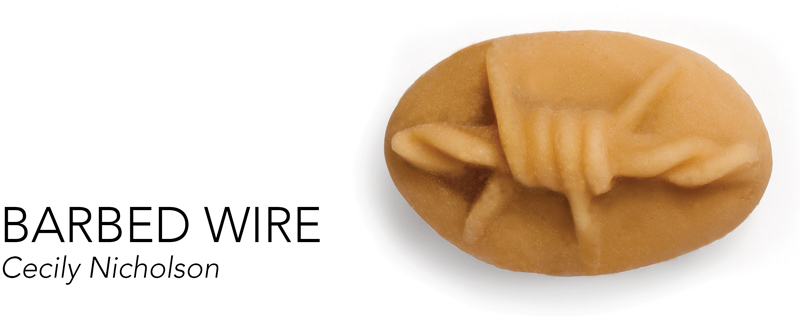
A longstanding symbol of oppression, barbed wire was invented as a method of enclosure. The woven wires with points placed at intervals proved an inexpensive way to divide property, to impede animals on the open range and to inhibit direct charges of armies. The technology was instrumental in attempts to “tame the west.” Electrified and braided with branches, aligned under tension between post or batten —the steel was galvanized for longevity. Enduring fences are valuable. Barbed wire however, is penetrable to people with the right tools. Razor wire, its human-proof cousin is used atop chain link fences. It features near-continuous cutting surfaces intended to rip clothing and flesh, to inflict serious cuts and psychological deterrence. These wires are under tension such that when cut, the recoil unfurls to lash the person cutting it. Wire fences contain camps: concentration and refugee. They bolster borders, mental institutions and prisons. More people than ever are incarcerated in Canada’s expanding and privatizing prisons. Incarceration rates for Indigenous and Black people continues to rise. Aboriginal people comprise approximately 4% of the population and 25% of the inmate population. In the last decade the Canadian government jailed 87,317 migrants without charges, including hundreds of children. Canada is one of the only “western” countries to have indefinite detention for migrants, with limited access to family and legal counsel. No One Is Illegal collectives and networks have used the symbol of a raised fist lifting barbed wire, imagining the passage of people across colonial borders.
![]()
Cecily Nicholson, from small-town Ontario via Toronto and South Bend, relocated to the Pacific coast two decades ago. Her work, both creative and social, is often in collaboration with artists and educators. Nicholson is the author of Wayside Sang, for which she received a 2018 Governor General’s Award for English Language Poetry; From the Poplars, winner of the 2015 Dorothy Livesay Poetry Prize and Triage. On Musqueam, Squamish and Tsleil-Waututh land known as Vancouver, she has worked in the Downtown Eastside neighbourhood for the last 18 years, most recently as administrator of the artist-run centre and mental health resource, Gallery Gachet. A part of the Joint Effort prison abolitionist group and member of the Research Ethics Board of Emily Carr University of Art and Design, Cecily is the newly appointed Interpretive Programmer at the Surrey Art Gallery.
